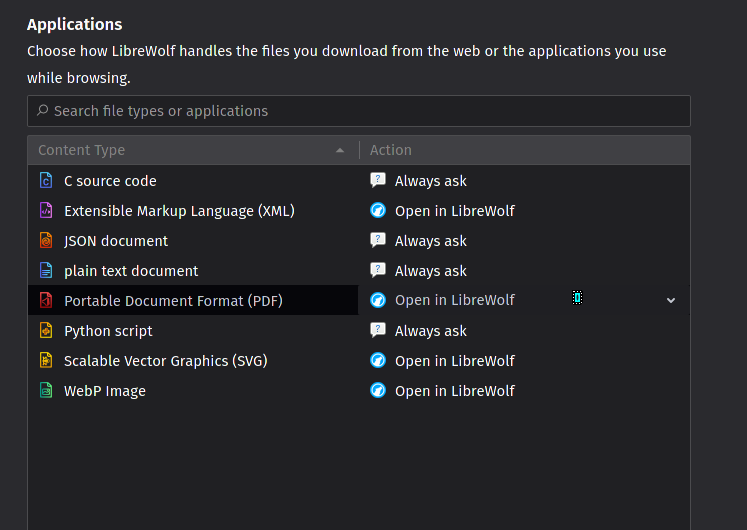
 Maintained by a small group of developers - however, it is a relatively "newer" project that has the capability to continuously pick up speed over time. These notable faults might compromise the general user experience and include:
Maintained by a small group of developers - however, it is a relatively "newer" project that has the capability to continuously pick up speed over time. These notable faults might compromise the general user experience and include: 
Due to it being a continuation of a previous fork, be aware that Librewolf is not without its faults. It's important to understand that Librewolf is the continuation of a previous Firefox fork, LibreFox. It is licensed under the Mozilla Public License 2.0. Again, it is an independent and community-run fork of the Firefox source code. Please note that Librewolf is not at all affiliated with Mozilla. Resists common fingerprinting techniques.
 Disables the saving of login information. Privacy friendly search engines (ex: DuckDuckGo, MetaGer, Qwant, and others). Forced HTTPS on all websites ( Read more about the importance of HTTPS). Extension firewall - extensions are limited in initiating their own connections. This makes Librewolf more out-of-the-box privacy friendly for the average user. Various privacy and security tweaks that overlap with various Firefox hardening guides - including the one published here on avoidthehack!. What's more is that one of the biggest draws to Librewolf is that it comes with a ton of already tweaked/configured settings that enhance user privacy and security. Mozilla telemetry, to include crash reporting and anonymous statistic collection. Google as 1) the default search provider and 2) a search option. Librewolf is very similar to Ungoogled Chromium in the sense that Librewolf has removed Mozilla dependencies, services and telemetry from the browser.įor example, Librewolf does not come with Pocket integration like regular Mozilla Firefox. Librewolf is also the community run successfor to another defunct Firefox fork known as Librefox. Librewolf is an independent fork of Firefox that puts "user privacy, security, and user freedom first."
Disables the saving of login information. Privacy friendly search engines (ex: DuckDuckGo, MetaGer, Qwant, and others). Forced HTTPS on all websites ( Read more about the importance of HTTPS). Extension firewall - extensions are limited in initiating their own connections. This makes Librewolf more out-of-the-box privacy friendly for the average user. Various privacy and security tweaks that overlap with various Firefox hardening guides - including the one published here on avoidthehack!. What's more is that one of the biggest draws to Librewolf is that it comes with a ton of already tweaked/configured settings that enhance user privacy and security. Mozilla telemetry, to include crash reporting and anonymous statistic collection. Google as 1) the default search provider and 2) a search option. Librewolf is very similar to Ungoogled Chromium in the sense that Librewolf has removed Mozilla dependencies, services and telemetry from the browser.įor example, Librewolf does not come with Pocket integration like regular Mozilla Firefox. Librewolf is also the community run successfor to another defunct Firefox fork known as Librefox. Librewolf is an independent fork of Firefox that puts "user privacy, security, and user freedom first."







 0 kommentar(er)
0 kommentar(er)
